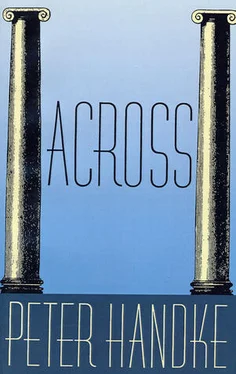Peter Handke - Across
Здесь есть возможность читать онлайн «Peter Handke - Across» весь текст электронной книги совершенно бесплатно (целиком полную версию без сокращений). В некоторых случаях можно слушать аудио, скачать через торрент в формате fb2 и присутствует краткое содержание. Год выпуска: 2000, Издательство: Farrar, Straus and Giroux, Жанр: Современная проза, на английском языке. Описание произведения, (предисловие) а так же отзывы посетителей доступны на портале библиотеки ЛибКат.
- Название:Across
- Автор:
- Издательство:Farrar, Straus and Giroux
- Жанр:
- Год:2000
- ISBN:нет данных
- Рейтинг книги:3 / 5. Голосов: 1
-
Избранное:Добавить в избранное
- Отзывы:
-
Ваша оценка:
- 60
- 1
- 2
- 3
- 4
- 5
Across: краткое содержание, описание и аннотация
Предлагаем к чтению аннотацию, описание, краткое содержание или предисловие (зависит от того, что написал сам автор книги «Across»). Если вы не нашли необходимую информацию о книге — напишите в комментариях, мы постараемся отыскать её.
Across — читать онлайн бесплатно полную книгу (весь текст) целиком
Ниже представлен текст книги, разбитый по страницам. Система сохранения места последней прочитанной страницы, позволяет с удобством читать онлайн бесплатно книгу «Across», без необходимости каждый раз заново искать на чём Вы остановились. Поставьте закладку, и сможете в любой момент перейти на страницу, на которой закончили чтение.
Интервал:
Закладка:
On their way out, the two of them stopped in the corridor and inserted a coin in the jukebox, which had one record of Macedonian folk music: the café was filled with a melody without beginning or end. And something that had never happened before: the café turned into the garden terrace of a restaurant on the west bank of the Jordan. The terrace was empty except for crackling gusts of sand, the slapping of palm leaves, and the sound of music without beginning or end. Eastward lay the Dead Sea depression; the pregnant woman straightened up in her chair, gathered her long hair together and piled it on top of her head; while the record was playing, she was a woman on the shores of the Dead Sea, an embodiment of the sea itself.
The outer door opened and closed. The adolescent appeared in the cleft between the curtains. Outside, on the embankment, he was holding the wine bottle in one hand and, without wavering, was carrying his uncle piggyback. Resting his log on his carrier’s shoulder, the child aimed into the darkness.
The card players had stopped playing, but remained seated in the same order. They began to talk quietly among themselves, without shouting or laughing; almost voicelessly. The landlord took the last orders and joined them. One of the players, as I hadn’t noticed before, was a woman. The youngest of the men moved closer to her. The three women at the next table had already gone. The little dog had lain down against the table leg and was sleeping. The ventilator on the canal side was whirring. An Asian in an orange plastic cape came in with a bundle of newspapers fresh off the press; a moment later, he had vanished; no one was in a reading mood just then.
Then came a slowdown, which seemed to suit those present; one by one, all made ready to leave, and then suddenly, after a moment of hesitation, they were in no hurry at all. It was an interval of patience, during which even the landlord stopped looking at the clock. The woman, who, apparently out of sorts, had just thrown the cards down in front of the man, began to toy with his shirt collar, and he kissed each one of her knuckles; the others at the table spoke to one another softly and, at most, looked at the couple from time to time, not out of the corners of their eyes but wide-eyed, almost dreamily. The landlord’s wife, who had finished cleaning up, stood in the white light of the open kitchen door; she was wearing high rubber boots. One of the men at the table inspected the palm of his hand, the lines of which were black with soot or oil. Another let out something resembling a yodel; not of joy or sorrow, but of weariness; the weariest of all yodels.
Then all had gone home except the lovers. In the kitchen, the landlord discussed the shopping for the next day with his wife. In the toilet, a late guest was standing at the washbasin; seen from behind, the chamois beard on his hat wavered, though the man was hardly moving.
Meanwhile, man and woman sat face to face, with a seriousness that gave them Egyptian profiles. The cautious though steady tightening of their enfolding arms suggested slowly closing tendrils. The man touched the woman’s neck with his fingertips, as though trying to feel her heartbeat there. From under motionless eyelids, she stared into his eyes, while at the same time, in a quick exchange, one spoke softly and urgently to the other. After that, they sat motionless, face to face, no longer recognizable, for an eternity, like the sun and moon in old engravings. Just for this man, this woman must have been the most beautiful woman in the world! For another eternity, red colored both their cheeks until — in simultaneous movement — he bent over her and she leaned not only her head but her whole body to one side, like a woman getting ready, in self-abandon, to rip the bearskin off the wall to cover herself and her lover with. “And the greatest of all things happened”—a paraphrase for bodily union occurring in shepherds’ tales. But did those two at the table in the Canal Tavern need to be bodily united? Weren’t they already one flesh? A small yellow pencil sped almost inaudibly downward, like a bird’s beak.
Afterward I lingered for a while outside on the em. bankment road, my back to the tavern with the drawn curtains. The couple’s voices were in the whirring of the ventilator: not a whispering or a murmuring, not really voices, just sounds, now higher, now lower, unintelligible yet penetrating; punctuated distinctly by the landlord’s voice: “Table 10.”
The patch of meadow on the other side of the canal was white with fog in spots, while the rest of it was quite open. The fog didn’t lift, but lay impenetrably dense on the ground, barely cloaking the tips of the grass. Two triangular ears were all that showed of a cat that was lurking there. However, a movement was discernible in the mist, not a steady flow of swaths, but a to-and-fro, a reaching out and a pulling back, a sudden surging up and flattening out, as though the fog were not fog at all but smoke from the peat smoldering under the grass. Sometimes the creeping whiteness seemed to boil up above eye level, as though from the subterranean bubbling of a geyser. Above it, the night was clear; the houses at the far end of the meadow rose out of their steamy foundations with contours all the sharper, and seemed more houselike than usual; and in my mind there was no longer a national boundary between me and the pyramid of the Staufen, now pointed in the moonlight.
The fog accompanied me on my way home. The way leads upstream, always along the canal; just once, it crosses a bridge to the other bank, and then crosses back again by the next bridge. At first, there’s a tarred road on the embankment, then a street belonging to the Colony, and finally, as far as the turnaround, a path for pedestrians and bicycles. Strangely enough, the fog never crossed the canal; the layers to the left and the right didn’t mingle, the water formed a sort of fog shed (each patch of meadow, pasture, or bog generated its own fog, differing from others in color and shape); on the watercourse itself, there were only transparent clouds of vapor. Suddenly a patch of woods, which only a moment before had been an island in the pond of mist, stood free in the black country, as though the underbrush had swallowed the whiteness. The fog piled up behind a fence as though stopped by an obstacle or a threshold. In an orchard, its meandering flow connected a tumbledown bakehouse with a beehive, whose wooden squares, despite the dark night all around, gleamed in every color above the milky whiteness. Once, when I stood still and looked down, the fog was knee-high and I couldn’t see my own feet; yet at the same time I clearly saw the pattern of the kitchen wall tiles in the lighted windows of a house nearby: roses. With all the many continuing sounds, bicycle dynamos, television sets, home carpentry, the silence was so great that a cow with its long-drawn-out mooing seemed to be blowing into a picture-book horn; pictures of an autumn fire, a rainstorm, another watercourse. The horn ended in my own breast; the usual breastplate wasn’t there anymore.
At regular intervals, the canal was bordered by small wooden signboards covered with posters of the various local political parties (one more election was in the offing); for the most part, portraits of local politicians with slogans you pick up in spite of yourself and can’t get out of your head. Mechanically, I kicked one of the signboards. It proved to be unanchored and my little kick almost knocked it over. Without looking around, I picked it up and threw it into the canal, where it sank instantly. The next one had tapering legs and was planted more firmly in the ground. Nevertheless, I was sure — as sometimes when opening a can — that I could get it out with one tug and tip it into the canal (as indeed I did). I disposed of all the other signboards in the same way. In the autumn, when the Alm would go dry for a month, the legs would rise up out of the muck, the discolored scraps of paper would swell, and the dredger that cleans the canal would pile all this junk, along with the usual tires, old clothes, and dead fish, onto garbage trucks. I once asked someone who knows me well whether he thought me capable of committing murder, and now the answer came back to me: “Committing, no. Wanting to, yes.” Was this a case of wanting to commit murder? No. Was it mere caprice, or, as they say, “malicious mischief”? No. In any event, while walking, I kept saying aloud a word which, I was well aware, did not provide the right answer either: “revenge”; with the addition: “I have a right to look at the water. By obstructing my view of the water, you are infringing on my rights.” (My inner cry at first sight of the face — silent, to be sure — on the poster: “Shut up!”)
Читать дальшеИнтервал:
Закладка:
Похожие книги на «Across»
Представляем Вашему вниманию похожие книги на «Across» списком для выбора. Мы отобрали схожую по названию и смыслу литературу в надежде предоставить читателям больше вариантов отыскать новые, интересные, ещё непрочитанные произведения.
Обсуждение, отзывы о книге «Across» и просто собственные мнения читателей. Оставьте ваши комментарии, напишите, что Вы думаете о произведении, его смысле или главных героях. Укажите что конкретно понравилось, а что нет, и почему Вы так считаете.












